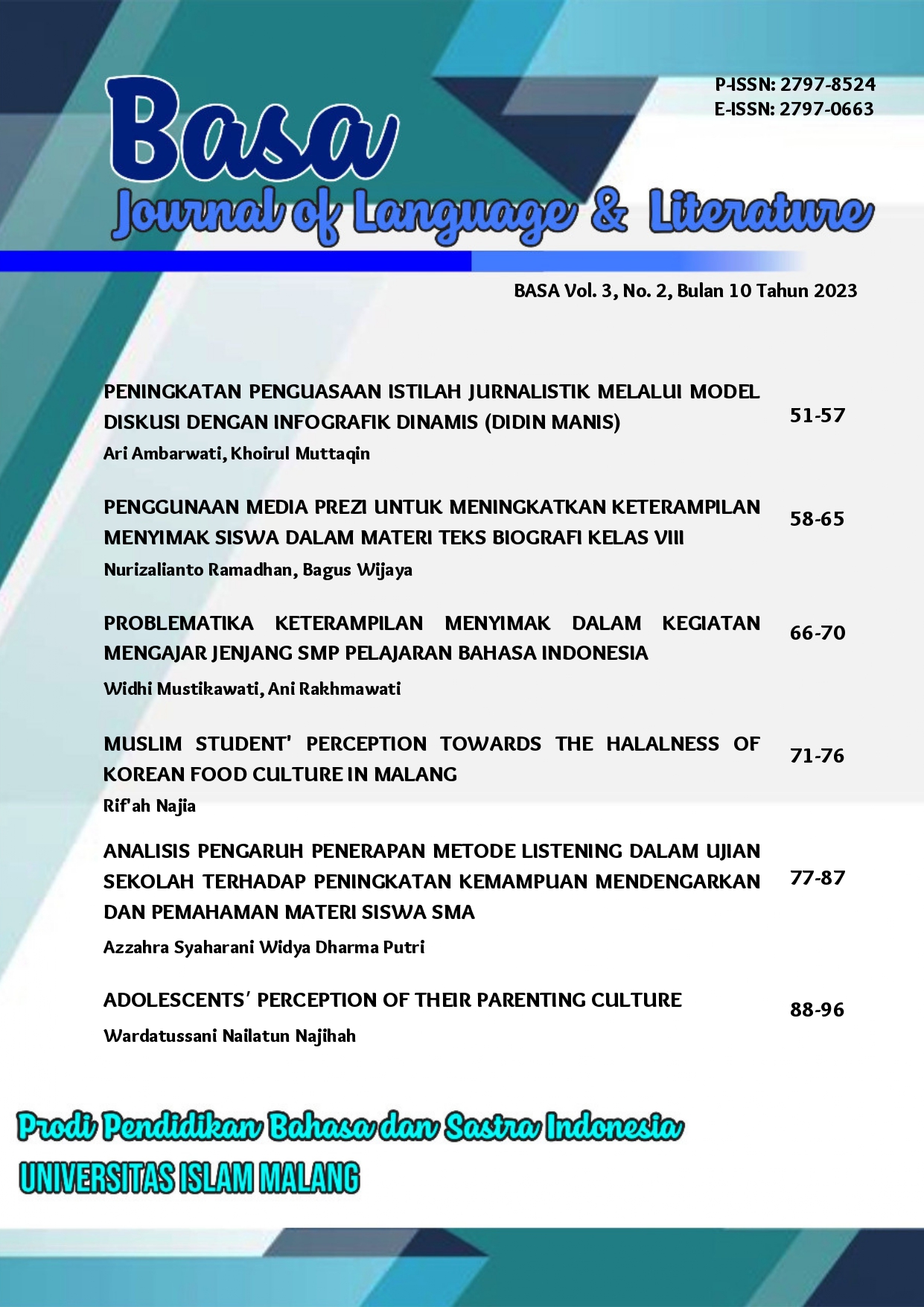ADOLESCENTS’ PERCEPTION OF THEIR PARENTING CULTURE
DOI:
https://doi.org/10.33474/basa.v3i2.19991Keywords:
Adolescent, perception, parenting, cultureAbstract
This study investigated the adolescents’ perception towards their parenting culture. This study is aimed to find out the culture of their parenting style. The researcher conducted this study by interviewing adolescents aged 15 to 25 years both female and male in Malang as sampling. This study uses the descriptive qualitative method since the intended result is a brief description of adolescents’ preception. The interviews used to collect the data information due to answer the research question. The finding of the study showed that most of the parents who live in Malang City mostly apply the Authoritative type of parenting style then for adolescents' perception they feel happy and don't feel pressured by their parenting culture. Moreover, The cultural background of parenting mostly uses parenting according to religious teachings and has a high level of education and a good environment.
References
Alfiasari, A., Latifah, M., & Wulandari, A. (2011). “Pengasuhan Otoriter Berpotensi Menurunkan Kecerdasan Sosial, Self-esteem, dan Prestasi Akademik Remaja.” In Jurnal Ilmu Keluarga dan Konsumen (Vol. 4, Issue 1, pp. 46–56). https://doi.org/10.24156/jikk.2011.4.1.46
Arafat, S. M. Y., Akter, H., Islam, M. A., Shah, M. M. A., & Kabir, R. (2020). Parenting: Types, Effects and Cultural Variation. Asian Journal of Pediatric Research, 3(3), 32–36. https://doi.org/10.9734/ajpr/2020/v3i330130
Aunola, K., Stattin, H., & Nurmi, J. E. (2000). Parenting styles and adolescents’ achievement strategies. Journal of Adolescence, 23(2), 205–222. https://doi.org/10.1006/jado.2000.0308
Barton, A. L., & Hirsch, J. K. (2016). Permissive parenting and mental health in college students: Mediating effects of academic entitlement. Journal of American College Health, 64(1), 1–8. https://doi.org/10.1080/07448481.2015.1060597
Chuen, B., Lo, Y., Nok, R., Lai, M., & Ng, T. K. (2020). Worry and Permissive Parenting in Association with the Development of Internet Addiction in Children. 1–12.
Emotion, W. M., Self-esteem, C., Rudy, D., & Grusec, J. E. (2014). Authoritarian Parenting in Individualist and Collectivist Groups : Associations Authoritarian Parenting in Individualist and Collectivist Groups : Associations With Maternal Emotion and Cognition and Children ’ s. February. https://doi.org/10.1037/0893-3200.20.1.68
Dornbusch, S. M., Ritter, P. L., Leiderman, P. H., Roberts, D. F., & Fraleigh, M. J. (1987). The relation of parenting style to adolescent school performance. Child Development, 58(5), 1244–1257. https://doi.org/10.1111/j.1467-8624.1987.tb01455.x
Enoh, D., Erhamwilda, D., & Afrianti, N. (2017). Mother Factory Worker’s Parenting Style and its Implication for Early Childhood Islamic Education*. 118, 986–991. https://doi.org/10.2991/icset-17.2017.159
Jahan, A., & Suri, S. (2016). Parenting Style in Relation to Mental Health among Female Adolescents. Abnormal and Behavioural Psychology, 02(03). https://doi.org/10.4172/2472-0496.1000125
Kiadarbandsari, A., Madon, Z., Hamsan, H. H., & Mehdinezhad Nouri, K. (2016). Role of parenting style and parents’ education in positive youth development of adolescents. Pertanika Journal of Social Sciences and Humanities, 24(4), 1465–1480.
Kuntoro, I., & … C. P. 2017-. (2017). Culture, parenting, and children’s theory of mind development in Indonesia. Journal of Cross-Cultural Psychology 1–21, 48(9), 1389–1409. https://doi.org/10.1177/0022022117725404
Olivari, M. G., Wahn, E. H., Maridaki-Kassotaki, K., Antonopoulou, K., & Confalonieri, E. (2015). Adolescent perceptions of parenting styles in Sweden, Italy and Greece: An exploratory study. Europe’s Journal of Psychology, 11(2), 244–258. https://doi.org/10.5964/ejop.v11i2.887
Rouzi, S., Afifah, N., & Hendrianto, C. (2020). Establishing an Islamic Learning Habituation Through the Prophets ’ Parenting Styles in the New Normal Era. 1(2), 101–111.
Shakya, H. B., Christakis, N. A., & Fowler, J. H. (2012). Parental Influence on Substance Use in Adolescent Social Networks. 166(12), 1132–1139. https://doi.org/10.1001/archpediatrics.2012.1372
Shek, D. T. L. (1998). Adolescents’ perceptions of paternal and maternal parenting styles in a chinese context. Journal of Psychology: Interdisciplinary and Applied, 132(5), 527–537. https://doi.org/10.1080/00223989809599285
Theresya, J., Latifah, M., & Hernawati, N. (2018). The Effect of Parenting Style, Self-Efficacy, and Self Regulated Learning on Adolescents’ Academic
Achievement. Journal of Child Development Studies, 3(1), 28. https://doi.org/10.29244/jcds.3.1.28-43
Downloads
Published
Issue
Section
License
Copyright (c) 2023 Wardatussani Nailatun Najihah

This work is licensed under a Creative Commons Attribution-ShareAlike 4.0 International License.
-
Authors who publish with this journal agree to the following terms:
- Authors retain copyright and grant the journal right of first publication with the work simultaneously licensed under a Creative Commons Attribution License that allows others to share the work with an acknowledgement of the work's authorship and initial publication in this journal.
- Authors are able to enter into separate, additional contractual arrangements for the non-exclusive distribution of the journal's published version of the work (e.g., post it to an institutional repository or publish it in a book), with an acknowledgement of its initial publication in this journal.
- Authors are permitted and encouraged to post their work online (e.g., in institutional repositories or on their website) prior to and during the submission process, as it can lead to productive exchanges, as well as earlier and greater citation of published work (See The Effect of Open Access).

BASA is licensed under a Creative Commons Attribution-ShareAlike 4.0 International License.
Based on a work at http://riset.unisma.ac.id/index.php/BASA/index


